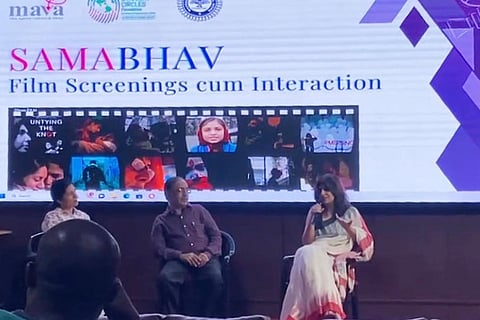

SamaBhav, a two-day film festival themed ‘Celebrating Gender, Equity, Diversity and Inclusion’, was organised at Chennai’s Egmore on April 22 and 23. The festival, with an exclusive lineup of short films, documentaries, and features including a few international films, was put together by Men Against Violence and Abuse (MAVA), an NGO that critically looks at traditional notions of masculinity. MAVA sensitises young boys and men, and encourages them to be part of ending gender-based discrimination.
Harish Sadani, the executive director of MAVA, told TNM that he feels films are a powerful medium that can effectively be used to unpack the complexities of patriarchal structures. “Patriarchy shapes notions like toxic masculinity. Men need to interrogate the rigid gender roles patriarchy dictates to them. For such an interrogation to happen, films, I feel, can be powerful tools,” he noted.
The films, a mix of shorts and documentaries, examine various aspects of justice, rejecting regressive notions of gender and sexuality. Arun Fulara’s My Mother’s Girlfriend, for instance, tries to speak about love and desire within the overlap of multiple identities— the protagonist is an LGBTQIA+, working-class, older woman. In a country that expects even cis-het older women to have no sexual desire, how would a queer, older woman running a small vegetable shop express her sexuality, the film asks. Then again, are the dreams and aspirations of young women easier to accomplish, and what of little girls living in remote villages?
In The Little Goddess, Durga (Panchami Choudhary) hopes for the day she can perform at a popular national singing reality show, but the only outlet her talent has is through the Bahurupi folk art form, out of which her family earns a small sustenance. Her spirit yearns for a kind of freedom she imagines is possible only in a big city like Kolkata. But the spirit of little girls and its ache for freedom is too often snuffed out by the greed of predatory men. Director Gauri Adhelkar leaves you mulling over that grim reality, though it does also make you wonder if the film could have ended any differently.
The other films screened at SamaBhav included works like Naanu Ladies, Counterfeit Kunkoo, and Trans Kashmir. Of all of them, one stood out with horrifying clarity. Miriam Chandy’s From the Shadows is a stark documentary on the trafficking of minor girls for sex work. Miriam takes you through the grim statistics, the numbingly different manners in which children, hardly seven years old, are sold and abused, the work of organisations like Impulse NGO Network, the labyrinth of legal battles, repatriation, and the painstaking effort girls who have escaped or have been rescued are forced to put in to rebuild their lives. Throughout all this, the director seems firm on ensuring one aspect above everything else — maintaining the agency of the women and girls her film is about.
Without any romanticism of trauma or struggles, we hear it as it is from the survivors themselves. Each of them has a different story, and each of them has different ideas on what kind of future they are going to choose for themselves.
Speaking at the event, Miriam recalled a series of graffiti that first drew her to the issue – the spray-painted silhouettes of young girls on city walls with the hashtag #missinggirls by Leena Kejriwal, an activist working with survivors of trafficking. Leena’s art and activism are a part of the film and seem to have contributed to the film’s title.
“To me that [the graffiti] was a very strong entry point,” Miriam said, adding, how she was curious about what lies behind the shadow. “Many people want to tell stories about trafficking, but what is a good way to enter the subject? For me, it was the artwork – provocative and mysterious, but not preachy. That’s what started the six-year journey into making the film.”
Harish also drew attention to the manner in which From the Shadows is structured. “Normally, a film about such a topic relies on sensationalism. Instead, this film shows you who the players involved in child trafficking are and how the nexus operates, in simple language. It captures, vividly, the human aspect of the issue.”
Speaking to TNM about the need to take such films to more people and the role that MAVA seeks to play in promoting gender justice, Harish said, “Concerns about gender-based discrimination and violence against women are seen by men as ‘women’s issues’. Partially, it is true, since those who are affected are women, but the root cause for that violence is the male view of women as subordinates or objects rather than equals. Masculinity is a social construct. Gender is a social construct. If they are constructs, then they are capable of change and social engineering. We have seen feminist movements led by empowered and assertive women, but at the same time, we see men in positions of power fumbling with these ideas of assertion and empowerment. Men raised with traditionalist views feel disconnected from such ideas, and the aim of MAVA is to create the kind of impact required to provoke men into introspecting.”
MAVA plans to travel to Kerala’s Kochi next to conduct a similar film festival.